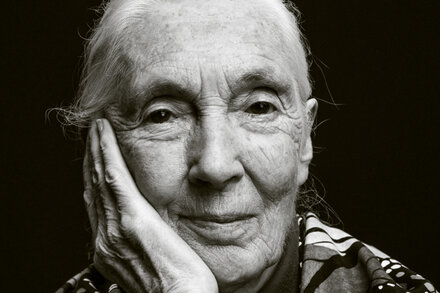
Dr. Jane Goodall, the world-renowned primatologist and anthropologist, has dedicated over six decades to understanding and protecting chimpanzees, transforming our perception of the natural world. Her pioneering work at Gombe Stream National Park in Tanzania revolutionized the field of primatology and paved the way for a global conservation movement, marking a life defined by scientific discovery, unwavering advocacy, and profound connection to nature.
Pioneering Research at Gombe
Goodall’s journey began in 1960 when, at the age of 26 and with no formal scientific training, she embarked on a mission to study wild chimpanzees on the shores of Lake Tanganyika. Funded by anthropologist Louis Leakey, her unconventional methods—including immersing herself among the chimpanzees, observing them without intervention, and giving them names instead of numbers—initially drew skepticism from the scientific community. However, her patience and empathy led to groundbreaking discoveries that reshaped our understanding of animal intelligence and behavior.
Among her most significant findings was the observation of chimpanzees making and using tools, a behavior previously believed to be exclusive to humans. She also documented their complex social structures, individual personalities, and emotional lives, revealing a species far more similar to humans than previously imagined.
“It was clear that these chimpanzees had personalities, minds and, above all, emotions,” Goodall famously remarked, highlighting the deep personal connection she forged with her subjects.
From Scientist to Global Advocate
By the mid-1980s, Goodall recognized that her research and the future of chimpanzees were threatened by habitat destruction and the illegal bushmeat trade. This realization prompted a significant shift in her life’s work, moving her focus from continuous field research to global environmental advocacy. In 1977, she established the Jane Goodall Institute (JGI), a global non-profit organization dedicated to wildlife research, conservation, and education. JGI’s innovative community-centered conservation approach acknowledges that protecting chimpanzees and their habitats requires addressing the needs of local human populations.
In 1991, Goodall founded the Roots & Shoots program, an initiative empowering young people in nearly 100 countries to undertake environmental and humanitarian projects in their communities. This program reflects her belief in the power of individual action and the importance of fostering a sense of responsibility for the planet among future generations.
“Every individual matters. Every individual has a role to play. Every individual makes a difference,” Goodall often asserts, encapsulating her message of hope and collective action.
An Enduring Legacy
Today, Dr. Jane Goodall continues to travel the world, speaking tirelessly about environmental protection, animal welfare, and the urgent need for action against climate change. Her work has not only expanded scientific knowledge but has also inspired countless individuals to engage with conservation efforts and reconsider humanity’s place within the natural world. Her enduring legacy is a testament to the power of observation, compassion, and the unwavering belief that a better future for all living beings is possible through sustained effort and collaboration.
Source: Read the original article here.





